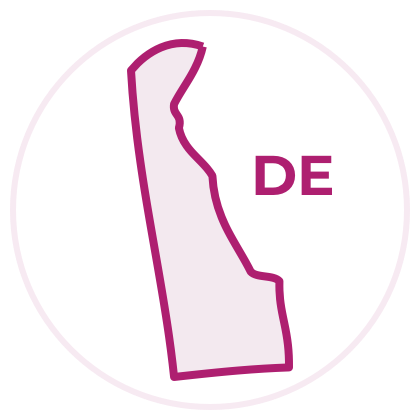Pre-Service Training
Delaware Department of Services for Children, Youth & Their Families (DSCYF) provides prospective foster and adoptive parents with the 27-hour Parents Resource for Information Development and Education (PRIDE) pre-service training program. Private agencies use a variety of pre-service training curricula, including PRIDE, Institute for Human Services (IHS), and provider-affiliated training. Although pre-service training in Delaware can vary, topics covered in each training are similar and include general information about the child welfare system, abuse and neglect including impact of trauma on child’s development, attachment and bonding, child development, positive behavior management, birth parent or former guardian relationships, and self-care. Most pre-service training requirements for prospective foster parents in Delaware are between 29 and 32 hours and for adoptive parents is between 29 and 50 hours depending on specific agency requirements. If prospective adoptive families are not dually certified as foster and adoptive families, they are referred to A Better Chance for our Children for an adoptive home study and adoption preparation training.
Services Offered Through the State’s Post-Permanency Support Program
Post-permanency services in Delaware are provided through contracts with three private agencies: A Better Chance for Our Children, Children & Families First, and Children’s Choice. Families can be involved with more than one agency.
Services include:
In fiscal year 2023, 147 received one-on-one case management services through the post-permanency program.
For more information, visit: https://kids.delaware.gov/family-services/post-adoption/
Geographic Area Covered
All three provider agencies have upstate and downstate offices, covering all geographic areas. Services are offered virtually as needed.
Eligible Population for the Overall Post-Permanency Program
Accessibility
Children’s Choice and Children & Families First employ bilingual staff.
Children’s Choice offers a kinship family support group for adoptive and guardianship families.
Outreach and Engagement
Families receive information regarding post-permanency services upon submitting a petition to adopt. Those who get an adoption subsidy receive information about post-permanency services in their annual review paperwork. If families interact with the child welfare system after adoption or guardianship is finalized, they receive information about post-permanency services. Post-permanency services are also promoted directly to families via social media.
How the Post-Permanency Program Is Operated
Notes About Who Provides Which Service(s)
A Better Chance for Our Children provides support groups, respite, specialized childcare, training, parent coaching, and educational advocacy.
Children & Families First provides case management, counseling, information and referral, support groups, and training.
Children’s Choice provides case management, support groups, educational advocacy, and training.
Adoption/Guardianship Assistance/Subsidy Review and Changes
Adoption assistance agreements are reviewed annually in Delaware.
Adoptive parents can request a change in an adoption assistance agreement at any time upon request or at the annual review, although changes are uncommon. Parents should make requests for a change in writing and send documentation supporting the request. Parents must furnish the state agency with information on the child’s special needs and family’s circumstances or changes. The adoptive family must also request the necessary documentation from a licensed physician, psychologist, psychiatrist or other licensed professional to substantiate the need for the change. This information is then presented to the Adoption Subsidy Specialist for review and approval.
Delaware does not have a guardianship assistance program.
Tracking Adoption/Guardianship Discontinuity
Delaware does not formally track re-entry.
Post-Permanency Program Spending (FY 2023)
Funding Sources for the Post-Permanency Program (FY 2023)
- Adoption savings (reported on CB 496 Part 4 – Annual Adoption Savings Report)
- Title IV-B, Part 2 (Promoting Safe and Stable Families/PSSF)
- State funds


